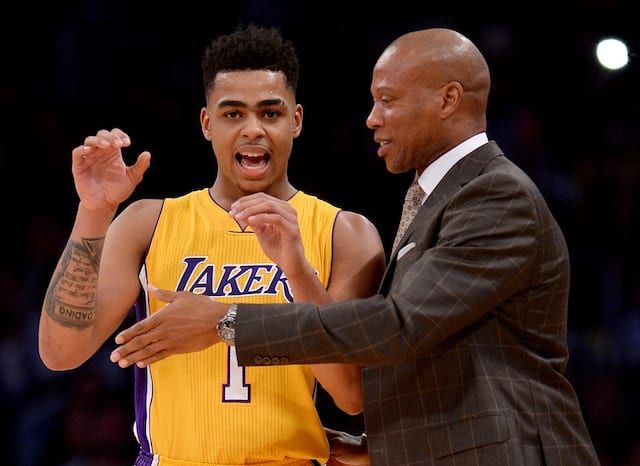Perhaps it’s only appropriate that the Los Angeles Lakers, sparked by the improved offensive game of D’Angelo Russell, are facing off tonight against the Houston Rockets. In some ways, the rookie guard has made recent progress by taking a page from his opponents’ playbook.
Over the past several years, the Rockets have been one of the leading practitioners of efficient scoring opportunities. They’ve strategically reduced their mid-range jumpers in favor of restricted-area and three-point shots. Although they’ve struggled this season, their “Moreyball” approach (named after their general manager Daryl Morey) has remained influential throughout the NBA.
How do these analytics relate to Russell’s improvements? The connection is admittedly figurative, but when we explore how his points per game has risen from 10.4 in November to 15.6 in December, we can see the familiar features of Moreyball.
For example, witness the shift in Russell’s shot locations (courtesy of NBA Savant):
In comparing the first (November) and second (December) heatmaps, we can detect higher levels of activity in the restricted area and behind the arc, as reflected by the bright red spots near the rim and around the perimeter. Mid-range shooting has concurrently shrunk. The result is greater concentration in efficient zones and better spacing.
The numbers reinforce these trends. In November, Russell had 164 field goal attempts, of which 52 (or 32 percent) were in the mid-range. He took roughly eight mid-range jumpers for every 10 three-point shots.
Thus far, in December, Russell has tallied 135 field goal attempts, of which 32 (or 24 percent) have been in the mid-range. He’s taken about six mid-range jumpers for every 10 three-point shots. As his scoring opportunities have increased, he’s pivoted away from historically inefficient zones.
Meanwhile, Russell’s presence has been more prominent behind the arc and around the rim. November saw him make 20 of 64 three-pointers (31 percent) in 432 minutes. December production has yielded 19 of 55 three-pointers (35 percent) in 279 minutes. Overall, he’s already hit approximately the same number of three-point shots in fewer attempts and in less time.
As for attacking the rim, we can get a glimpse of Russell’s development by observing his drives to the basket. In November, he had 31 of these plays, generating 15 points and three assists. This month, he’s already surpassed that performance with 39 drives, 29 points, and four assists. When we look more broadly at the percentage of shots within five feet of the basket, we find that he’s gone up from 16 percent to 23 percent.
It remains to be seen whether Russell’s recent advancements represent a sustainable step forward or just a temporary surge.
For one thing, he still struggles to get to the line. For another, because sample sizes are small, the numbers could be influenced by opponent strength, lineup changes, random luck, and a whole host of other factors.
But, while we would never want to draw hard conclusions from a few hundred shots, we can certainly take encouragement from the positive turn that Russell has made this month. It’s given us a peek at the high potential that led to his lofty draft position. And it’s helped us understand the types of skills that the Lakers should continue to hone as they build for the future.
Note: November statistics include the two games played in October.






